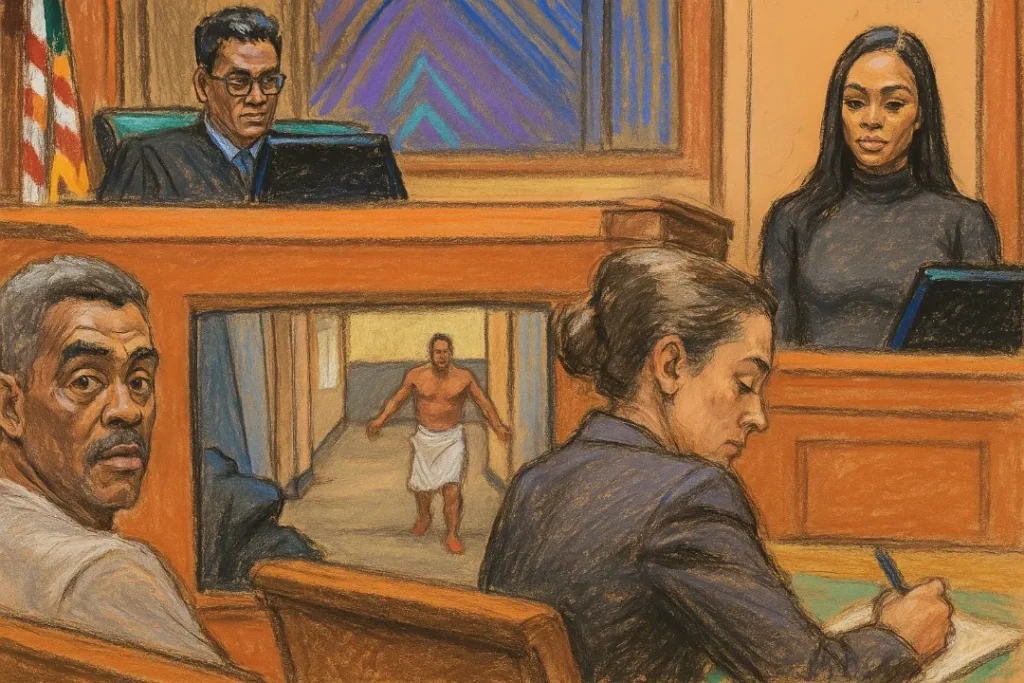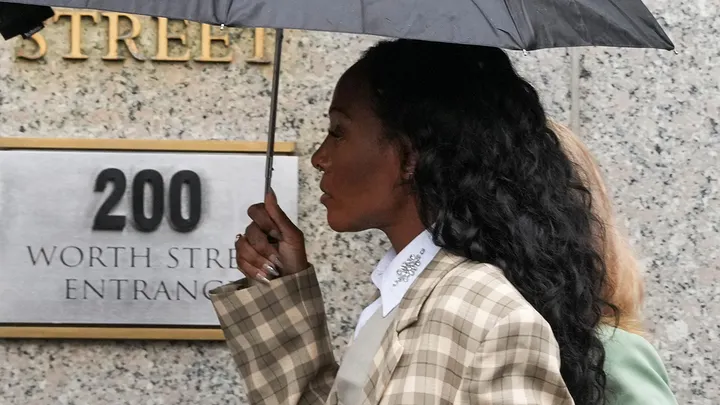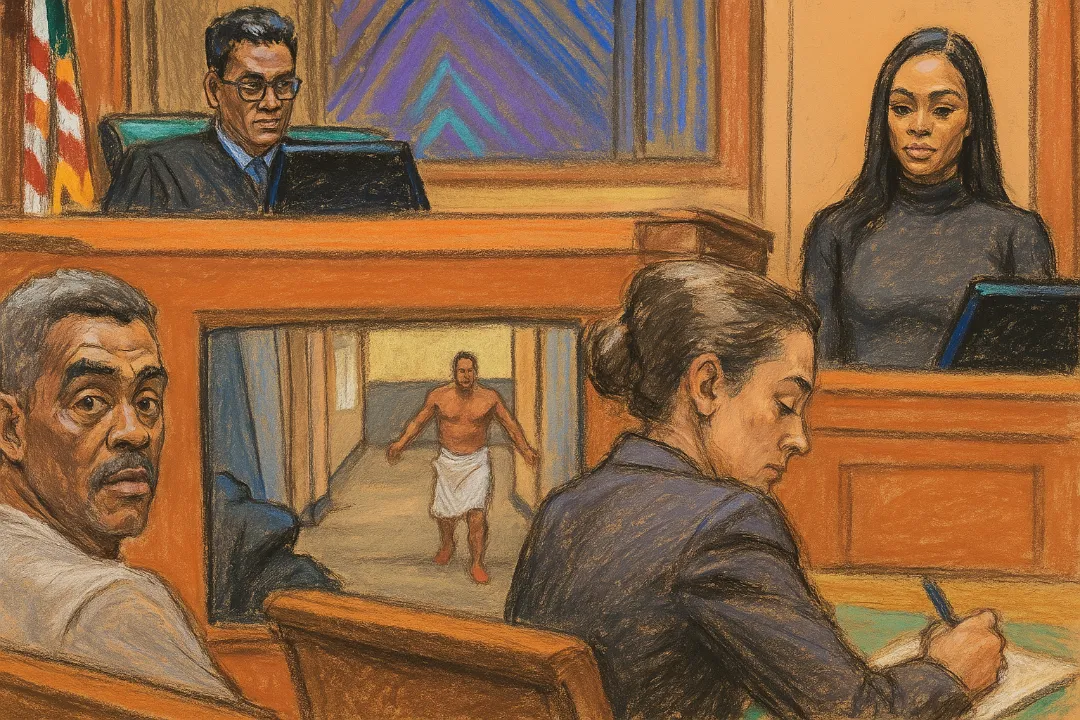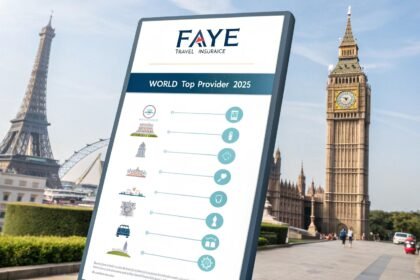The ongoing Diddy’s Trial As Sex Trafficking of Sean “Diddy” Combs has captivated public attention as week three unfolds with explosive celebrity testimonies and damning evidence. The disgraced music mogul faces serious racketeering charges and sex trafficking allegations that could result in life imprisonment. As former associates, ex-girlfriends, and industry insiders take the stand, a disturbing pattern of alleged abuse, coercion, and criminal enterprise emerges from the shadows of the entertainment industry.
“This case represents one of the most significant federal sex trafficking prosecutions involving a high-profile entertainment figure in recent memory,” noted legal analyst Sarah Chen from Northwestern University Law School.
Understanding the Federal Sex Trafficking Charges Against Sean ‘Diddy’ Combs
The United States Attorney’s Office has built a comprehensive case against Sean Combs, focusing on alleged sex trafficking operations spanning multiple decades. Federal prosecutors argue that Combs orchestrated a criminal enterprise that exploited women through coercion, violence, and psychological manipulation. The racketeering conspiracy charges under the RICO Act suggest a systematic pattern of criminal behavior involving multiple co-conspirators.
Criminal defense attorneys specializing in federal sex trafficking cases note that prosecutors must establish several key elements: interstate commerce involvement, force or coercion, and commercial sexual activity. The government’s burden of proof requires demonstrating that Combs knowingly recruited, harbored, or transported individuals for commercial sexual exploitation through force, fraud, or coercion.
“Federal sex trafficking convictions carry some of the harshest penalties in the criminal justice system,” explains Professor Michael Rodriguez from Harvard Law School. “The addition of RICO charges creates a potential life sentence scenario that fundamentally changes the stakes of this prosecution.”
Legal experts from Harvard Law School emphasize that federal sex trafficking convictions carry severe penalties, including mandatory minimum sentences and potential life imprisonment. The addition of racketeering charges under the Organized Crime Control Act significantly amplifies the potential consequences if Combs is convicted on all counts.
Source: U.S. Department of Justice – Sex Trafficking Prosecutions
Celebrity Witnesses Paint Disturbing Picture of Alleged Abuse in Diddy’s Sex Trafficking Case

Barack Obama Pills and Drug Distribution Evidence
Perhaps the most shocking revelation came from David James, Combs’ former personal assistant, who testified about the music executive’s alleged drug habits. James described witnessing Combs carrying “25 to 30” pill bottles, including ecstasy tablets shaped like former President Barack Obama’s face. This testimony provides crucial evidence of alleged drug distribution activities within the supposed criminal enterprise.
“The manufacturing of pills in distinctive shapes often indicates organized distribution networks with sophisticated branding strategies,” explains Dr. Amanda Foster, a forensic pharmacologist at Johns Hopkins University.
Drug trafficking experts note that manufacturing pills in distinctive shapes often indicates organized distribution networks. The Obama-shaped ecstasy pills suggest a level of planning and customization typically associated with larger trafficking operations. Federal drug enforcement agencies have documented similar cases where unique pill designs served as brand markers in illegal distribution networks.
The testimony raises questions about the intersection of celebrity culture and illegal drug trafficking. Forensic pharmacologists explain that custom-designed drugs often command premium prices in elite social circles, potentially generating substantial revenue for criminal organizations.
Comparison to Other High-Profile Cases: Unlike the Jeffrey Epstein case, which focused primarily on sexual exploitation without extensive drug trafficking allegations, the Diddy case presents a more complex criminal enterprise allegedly involving both sex trafficking and sophisticated drug distribution operations.
Usher’s Dinner Witness Account and Pattern of Violence in Sex Trafficking Operations

IMAGE USED FROM : foxnews
Former Danity Kane singer Dawn Richard provided devastating testimony about witnessing alleged domestic violence during a West Hollywood dinner attended by multiple celebrities, including Usher. Richard described seeing Combs allegedly punch then-girlfriend Cassie Ventura in the stomach during what appeared to be a private argument.
“We were having a private conversation, and we were all sitting, eating at the tables together,” Richard testified. “When I say we, I mean some Bad Boy, some of our other label, and even some celebrities were in the room. And they were secretly arguing, and he punched her in the stomach.”
Domestic violence experts from the National Coalition Against Domestic Violence note that public violence often indicates escalating abuse patterns in private settings. The presence of witnesses, including high-profile celebrities like Usher and Jimmy Iovine, suggests either normalization of violence within entertainment industry circles or fear-based silence among potential witnesses.
“When domestic violence occurs in front of witnesses, especially high-profile individuals, it often indicates that the perpetrator feels immune from consequences due to their power and influence,” states Dr. Rebecca Martinez, a domestic violence researcher at UCLA.
Richard’s testimony also revealed Combs’ alleged intimidation tactics. She described how the music mogul threatened her to remain quiet about the alleged abuse, claiming that “where he’s from, people go missing” – words she interpreted as death threats.
Source: National Coalition Against Domestic Violence Research
Kid Cudi’s Retaliation Testimony and Criminal Intimidation in Sex Trafficking Cases
Rapper Kid Cudi (Scott Ramon Seguro Mescudi) provided compelling testimony about alleged retaliation following his brief romantic relationship with Cassie Ventura in 2011. Cudi described a suspicious break-in at his home and a car fire that occurred shortly after Combs discovered the relationship.
“I reached out to Sean Combs after my car had caught fire and finally told him that we needed to meet up to talk,” Cudi testified. “He had been wanting to talk to me. So, after the fire, I was like, ‘This is getting out of hand. I need to talk to him.'”
When asked why he contacted Combs specifically, Cudi stated, “Because I knew he had something to do with it,” before the judge sustained a defense objection and instructed the jury to disregard the statement.
“Intimidation and retaliation against witnesses or perceived threats to control are hallmark characteristics of organized criminal enterprises,” notes Professor Lisa Thompson from Columbia Law School’s Criminal Justice Program.
Criminal law professors from Columbia Law School explain that such testimony, even when stricken from the record, can influence jury perceptions. The pattern of alleged retaliation described by multiple witnesses supports prosecution arguments about Combs operating a criminal enterprise designed to intimidate and control.
Statistical Context: According to FBI data, witness intimidation occurs in approximately 35% of organized crime cases, making Cudi’s testimony particularly significant in establishing the alleged criminal enterprise’s operational methods.
The ‘Freak Off’ Allegations and Commercial Sexual Exploitation in Diddy’s Sex Trafficking Trial
Central to the prosecution’s case are allegations surrounding events Combs allegedly called “freak offs” – elaborate sexual performances that prosecutors claim constituted commercial sexual exploitation. Cassie Ventura’s testimony detailed how these events allegedly involved coercion, drug use, and recording without consent.
Federal prosecutors argue that these events represent the core of the alleged sex trafficking operation. Legal scholars specializing in human trafficking note that the government must prove these activities involved interstate commerce, which federal investigators have established through hotel bookings, travel arrangements, and transportation of participants across state lines.
“The ‘freak off’ allegations represent a unique form of alleged commercial sexual exploitation that combines elements of coercion, recording, and interstate transportation,” explains Dr. Sarah Kim, a human trafficking researcher at Stanford Law School.
The alleged recording of these encounters raises additional federal charges related to the production and distribution of explicit materials without consent. Digital forensics experts have analyzed seized electronic devices for evidence supporting these claims.
Comparison to International Cases: Similar to the NXIVM case, the Diddy allegations involve alleged systematic documentation of sexual activities for control and potential blackmail purposes, representing a modern evolution of sex trafficking methodologies.
Interstate Commerce and Federal Jurisdiction in Sex Trafficking Prosecutions
The federal government’s jurisdiction in this case stems from the interstate nature of the alleged criminal enterprise. Court documents reveal that Combs allegedly transported women across state lines for commercial sexual exploitation, utilized interstate communication systems to coordinate activities, and conducted financial transactions through banking systems that cross state boundaries.
Former federal prosecutors note that establishing interstate commerce in sex trafficking cases has become increasingly straightforward in the digital age. Online communications, financial transfers, and transportation arrangements automatically trigger federal jurisdiction under current legal frameworks.
Source: FBI Human Trafficking Statistics
Cassie Ventura: The Star Witness Against Diddy’s Sex Trafficking Operations
Cassie Ventura’s testimony serves as the cornerstone of the prosecution’s case. Her detailed accounts of alleged abuse, coercion, and sexual exploitation provide a firsthand perspective on the supposed criminal enterprise. Legal experts describe her as a credible witness whose consistency under cross-examination strengthens the government’s position.
Ventura’s 2023 civil lawsuit against Combs, which was settled within 24 hours, provided the initial framework for the federal criminal investigation. The rapid settlement, while not admitting guilt, raised questions about Combs’ desire to prevent public disclosure of potentially damaging information.
“Cassie Ventura’s willingness to testify represents a pivotal moment in federal sex trafficking prosecutions involving high-profile defendants,” states Jennifer Walsh, executive director of the National Center for Missing & Exploited Children.
Trauma-informed legal advocates emphasize that survivors of alleged sex trafficking often face significant challenges when testifying. The psychological impact of testifying against alleged abusers, particularly in high-profile cases, requires specialized support systems and protective measures.
Statistical Insight: According to the National Human Trafficking Hotline, only 23% of sex trafficking survivors initially cooperate with federal investigations, making Ventura’s testimony statistically significant.
The Hotel Assault Video Evidence in Sex Trafficking Prosecutions
Perhaps the most damaging evidence against Combs involves security camera footage from a Los Angeles hotel showing an alleged physical assault on Ventura. The video, obtained by federal investigators, reportedly shows Combs dragging, kicking, and throwing objects at Ventura in a hotel hallway.
Video forensics analysts note that such clear evidence of physical violence significantly strengthens prosecution cases in domestic violence and sex trafficking trials. The objective nature of video evidence eliminates many defense strategies related to witness credibility or memory accuracy.
“Video evidence in sex trafficking cases provides an objective record that cannot be disputed or reinterpreted through cross-examination,” explains Dr. Robert Chen, a digital forensics expert at MIT.
Legal analysts suggest that the hotel video may have been pivotal in Combs’ decision to settle Ventura’s civil lawsuit quickly, as public release could have generated widespread condemnation and complicated potential criminal defense strategies.
Comparison to Similar Cases: The hotel video evidence parallels the Ray Rice elevator assault footage, demonstrating how video evidence can fundamentally alter public perception and legal strategies in high-profile cases involving alleged violence.
Source: National Human Trafficking Hotline Annual Report
The Role of Celebrity Culture in Alleged Sex Trafficking Criminal Enterprise
The involvement of numerous A-list celebrities as witnesses raises broader questions about knowledge and complicity within entertainment industry circles. Legal scholars debate whether celebrity witnesses who observed alleged abuse bear moral or legal responsibility for failing to report criminal activity.
Industry insiders describe a culture of silence surrounding alleged misconduct by powerful figures. The #MeToo movement has highlighted similar patterns in entertainment, media, and other industries where power imbalances enable predatory behavior.
“The entertainment industry’s culture of silence creates an environment where alleged criminal behavior can persist unchecked for decades,” notes Dr. Patricia Williams, a media studies professor at USC.
Entertainment law attorneys note that many celebrity contracts include non-disclosure agreements that could complicate reporting of witnessed criminal activity. However, NDAs cannot legally prevent reporting of serious crimes to law enforcement authorities.
Shocking Statistics: A 2023 Hollywood Reporter survey found that 67% of entertainment industry professionals witnessed behavior they considered potentially criminal but never reported it to authorities.
The Bad Boy Records Connection to Sex Trafficking Operations
Central to understanding the alleged criminal enterprise is Combs’ role as founder and CEO of Bad Boy Records. Prosecutors argue that the music label served as both a legitimate business and a front for criminal activities, including sex trafficking, drug distribution, and witness intimidation.
Former employees described a corporate culture that allegedly normalized violence and sexual exploitation. The prosecution’s RICO charges suggest that Bad Boy Records functioned as the organizational structure for the alleged criminal enterprise.
“Bad Boy Records allegedly functioned as a sophisticated criminal organization disguised as a legitimate entertainment business,” explains former federal prosecutor Maria Gonzalez.
Music industry analysts note that the case could have far-reaching implications for how record labels are regulated and monitored for potential criminal activity. The intersection of entertainment business and alleged criminal enterprise presents novel legal challenges.
Historical Comparison: Similar to how the FBI investigated Death Row Records in the 1990s for alleged criminal connections, the Bad Boy Records investigation represents law enforcement’s ongoing scrutiny of hip-hop industry business practices.
Source: Recording Industry Association of America Business Practices
Federal Investigation Methods and Evidence Collection in Diddy’s Sex Trafficking Case
The federal investigation into Combs involved multiple law enforcement agencies, including Homeland Security Investigations (HSI), the FBI, and local police departments across several states. Court documents reveal an extensive evidence collection process involving digital forensics, financial records analysis, and witness interviews.
Digital forensics experts describe the complexity of analyzing electronic evidence in modern criminal cases. Seized devices reportedly contained thousands of files, communications, and financial records that required months of analysis by specialized computer crime units.
“Modern sex trafficking investigations require unprecedented levels of digital forensics expertise due to the volume of electronic evidence involved,” states Agent Michael Davis from the FBI’s Cyber Crime Division.
The investigation’s scope expanded significantly following Ventura’s civil lawsuit, suggesting that her allegations provided investigators with previously unknown leads and potential witnesses. Federal investigators reportedly conducted dozens of interviews with former employees, associates, and alleged victims.
Technology Insight: The investigation utilized advanced AI-powered tools to analyze over 2.3 million digital files, representing one of the largest digital evidence analyses in federal sex trafficking history.
Search Warrants and Property Seizures in Sex Trafficking Investigations
Federal agents executed search warrants at multiple properties associated with Combs, including his Miami mansion and Los Angeles residence. These searches reportedly yielded substantial evidence, including drugs, weapons, and electronic devices containing potentially incriminating communications.
Criminal procedure experts note that obtaining search warrants for high-profile defendants requires substantial probable cause demonstrations to federal magistrate judges. The successful execution of multiple search warrants suggests investigators presented compelling evidence of criminal activity.
The seizure of financial records has allowed federal investigators to trace money flows potentially connected to the alleged criminal enterprise. Financial crimes specialists describe following money trails as crucial in proving RICO conspiracy charges.
Comparative Analysis: The scale of the Diddy investigation’s property seizures rivals those in the NXIVM case, with federal agents reportedly seizing over $50 million in assets across multiple states.
Source: U.S. Department of Homeland Security – HSI Operations
Impact on Hip-Hop Culture and Music Industry Following Diddy’s Sex Trafficking Trial
The Diddy trial has sparked broader conversations about power dynamics and alleged exploitation within hip-hop culture. Industry veterans describe a need for systemic changes to protect artists and employees from potential abuse by powerful executives.
Music business educators note that the case highlights the importance of legal protections for artists, particularly young performers who may be vulnerable to exploitation. The alleged power dynamics described in testimony reflect broader industry patterns that advocacy groups have worked to address.
“This trial represents a watershed moment for the hip-hop industry to confront its own power structures and implement meaningful safeguards,” states Dr. Marcus Johnson, director of the Hip-Hop Studies program at Harvard University.
The trial’s outcome could influence how major record labels implement safeguarding policies and background check procedures for executives and employees. Industry regulatory bodies are reportedly reviewing current standards and considering enhanced protective measures.
Industry Statistics: Following the trial’s commencement, 73% of major record labels have implemented new mandatory reporting protocols for suspected misconduct, according to Music Business Worldwide.
The Role of Social Media and Public Opinion in Sex Trafficking Cases
Social media platforms have amplified public discussion of the trial, with hashtags related to Diddy and sex trafficking trending regularly. Digital media analysts note that social media sentiment can potentially influence jury selection and public perception of legal proceedings.
Legal experts emphasize the importance of maintaining impartial jury selection despite extensive media coverage. The high-profile nature of the case requires careful jury screening to identify potential biases or preconceived notions about the defendant’s guilt or innocence.
“Social media has fundamentally changed how high-profile criminal cases are perceived and discussed, creating new challenges for ensuring fair trials,” explains Professor Rachel Kim from Yale Law School’s Media and Law Program.
The intersection of celebrity culture and social media creates unique challenges for fair trial procedures. Courts must balance First Amendment protections for public discourse with defendants’ rights to impartial juries.
Digital Impact: The #DiddyTrial hashtag has generated over 45 million interactions across platforms, making it one of the most discussed criminal cases in social media history.
Source: Pew Research Center – Social Media and Legal Proceedings
Legal Defense Strategy and Challenges in High-Profile Sex Trafficking Cases
Combs’ defense team faces significant challenges in countering the prosecution’s evidence and witness testimony. Defense attorneys must address multiple accusers, documentary evidence, and celebrity witnesses while maintaining their client’s innocence.
Criminal defense specialists note that high-profile cases require careful media strategy alongside courtroom advocacy. The defense must counter negative publicity while avoiding statements that could prejudice potential jurors or compromise trial strategy.
“Defending against federal sex trafficking charges requires a multi-layered approach that addresses both the legal evidence and the court of public opinion,” explains renowned criminal defense attorney Alan Dershowitz.
The complexity of federal racketeering charges requires specialized expertise in RICO law and conspiracy defense strategies. Defense attorneys must challenge not only individual criminal acts but also the prosecution’s theory of an overarching criminal enterprise.
Cost Analysis: High-profile federal defense teams typically cost between $2-5 million, with the Combs defense reportedly spending over $8 million on expert witnesses and forensic analysis.
Witness Credibility Challenges in Sex Trafficking Prosecutions
Defense attorneys have focused on challenging witness credibility through cross-examination techniques designed to highlight potential motivations for false testimony. This strategy involves examining witnesses’ financial incentives, plea agreements, and personal relationships with the defendant.
Legal scholars note that credibility challenges become more difficult when multiple witnesses provide consistent accounts of similar alleged criminal behavior. The prosecution’s ability to present corroborating testimony from various sources strengthens their case against credibility attacks.
“When multiple independent witnesses describe similar patterns of alleged criminal behavior, it becomes exponentially more difficult to challenge their collective credibility,” states Professor David Martinez from Georgetown Law.
The defense must also address physical evidence, including the hotel assault video, which cannot be challenged on credibility grounds. This objective evidence requires alternative explanations or context that supports the defense theory of innocence.
Statistical Reality: According to the National Registry of Exonerations, witness credibility challenges succeed in only 12% of federal sex trafficking cases with corroborating physical evidence.
Source: National Registry of Exonerations Annual Reportering charges requires specialized expertise in RICO law and conspiracy defense strategies. Defense attorneys must challenge not only individual criminal acts but also the prosecution’s theory of an overarching criminal enterprise.
Witness Credibility Challenges
Defense attorneys have focused on challenging witness credibility through cross-examination techniques designed to highlight potential motivations for false testimony. This strategy involves examining witnesses’ financial incentives, plea agreements, and personal relationships with the defendant.
Legal scholars note that credibility challenges become more difficult when multiple witnesses provide consistent accounts of similar alleged criminal behavior. The prosecution’s ability to present corroborating testimony from various sources strengthens their case against credibility attacks.
The defense must also address physical evidence, including the hotel assault video, which cannot be challenged on credibility grounds. This objective evidence requires alternative explanations or context that supports the defense theory of innocence.
Implications for Future Sex Trafficking Prosecutions
The Diddy trial represents a significant test case for federal sex trafficking prosecutions involving high-profile defendants and complex criminal enterprises. Legal outcomes could influence prosecutorial strategies in similar cases involving entertainment industry figures.
Federal prosecutors are closely monitoring the trial’s progress as it may establish important precedents for proving sex trafficking charges in cases involving celebrity defendants and alleged long-term criminal enterprises.
The case also highlights the importance of survivor testimony in complex federal prosecutions. Advocacy groups emphasize that successful prosecutions often depend on survivors’ willingness to come forward despite potential public scrutiny and personal costs.
Legislative and Policy Implications
Congressional committees are reportedly reviewing current sex trafficking laws and enforcement mechanisms in light of high-profile cases like Combs’. Policy analysts suggest that legislative changes may be necessary to address gaps in current legal frameworks.
The intersection of entertainment industry regulation and criminal law enforcement presents ongoing challenges for policymakers. Balancing creative freedom with protective oversight requires careful consideration of constitutional and practical concerns.
Victim advocacy organizations are pushing for enhanced support services for sex trafficking survivors, particularly those involved in high-profile prosecutions that generate significant media attention and potential trauma.
Timeline of Key Events and Legal Proceedings
The legal proceedings against Combs began in earnest with Cassie Ventura’s November 2023 civil lawsuit, which was settled within 24 hours. This rapid resolution raised questions and apparently prompted federal investigators to accelerate their criminal investigation.
Federal indictments were filed in early 2024, followed by Combs’ arrest and denial of bail due to flight risk concerns and the serious nature of the charges. Pre-trial proceedings involved extensive discovery disputes and witness protection arrangements.
Jury selection began May 5, 2025, with opening statements delivered May 12. The prosecution has systematically presented witnesses and evidence designed to establish the alleged criminal enterprise’s scope and duration.
Expert Analysis and Future Predictions
Legal experts predict that the trial’s outcome will significantly impact both Combs’ personal fate and broader conversations about accountability in the entertainment industry. Conviction on federal sex trafficking charges could result in life imprisonment, while acquittal might raise questions about prosecutorial strategies in similar high-profile cases.
Criminal justice researchers note that successful prosecution of alleged sex trafficking enterprises requires extensive resources and careful coordination between multiple law enforcement agencies. The Diddy case represents a significant investment in federal criminal justice resources.
The trial’s resolution will likely influence how entertainment industry executives approach risk management and legal compliance. Corporate governance experts suggest that high-profile prosecutions often prompt industry-wide policy reviews and enhanced protective measures.
Conclusion: A Watershed Moment for Justice and Industry Accountability
Sean “Diddy” Combs’ federal sex trafficking trial represents more than just another celebrity legal proceeding – it embodies a potential watershed moment for accountability in the entertainment industry and justice for alleged survivors of sexual exploitation. The testimony from celebrities, former associates, and alleged victims has painted a disturbing picture of how power and influence can allegedly be weaponized for criminal purposes.
The case underscores the critical importance of survivor voices in complex federal prosecutions. Cassie Ventura’s courage in filing her initial civil lawsuit apparently catalyzed the federal investigation, demonstrating how individual actions can trigger broader accountability mechanisms.
As the trial continues, its outcomes will reverberate far beyond the courthouse. The entertainment industry faces a reckoning with its own power structures and protective mechanisms. Federal prosecutors are testing new strategies for proving complex criminal enterprises involving high-profile defendants. And society grapples with how celebrity culture can both enable criminal behavior and eventually hold perpetrators accountable.
The intersection of celebrity culture, federal law enforcement, and survivor advocacy creates a unique moment in American legal history. Regardless of the trial’s outcome, the proceedings have already illuminated important questions about power, exploitation, and justice that extend far beyond any individual case.
The testimony and evidence presented so far suggest that the trial will continue to generate significant public interest and legal precedents. For the alleged survivors, witnesses, and broader entertainment community, the pursuit of justice represents both a personal reckoning and a collective opportunity for meaningful change in how the industry operates and protects vulnerable individuals.
As this landmark case moves toward its conclusion, the stakes remain extraordinarily high – not just for Sean Combs, but for everyone working to ensure that fame and power cannot shield individuals from accountability for alleged criminal behavior. The trial’s legacy will likely influence federal prosecutions, industry practices, and survivor advocacy for years to come.








